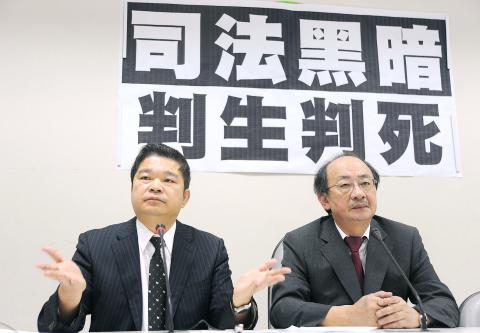Democratic Progressive Party (DPP) Legislator Tsai Huang-liang (蔡煌瑯) and seven former legislators across party lines were yesterday each sentenced to more than seven years in prison by the Taiwan High Court for accepting bribes from the Taiwan Dental Association in return for their endorsement of the Oral Healthcare Act (口腔健康法).
The Taipei District Court found the eight not guilty in October last year, but in yesterday’s ruling, Tsai was sentenced to eight years in prison and his civil rights were suspended for five years. Tsai’s elder brother, Tsai Chao-cheng (蔡朝正), an executive at a pharmaceutical company, was also sentenced to eight years in prison and had his civil rights suspended for five years.
Former DPP legislators Jao Yung-ching (趙永清) and Lee Ming-hsien (李明憲), former Chinese Nationalist Party (KMT) legislator Chang Tsa-mei (張蔡美) and former People First Party (PFP) legislator Chiu Chuang-liang (邱創良) were all sentenced to seven-and-a-half years in prison and their civil rights were suspended for three years.

Photo: Taipei Times
Former PFP legislator Yang Fu-mei (楊富美) and former DPP legislator Lee Chen-nan (李鎮楠) were sentenced to seven years and two months in prison, and their civil rights were suspended for three years.
Former DPP legislator Liao Pen-yen (廖本煙) was sentenced to seven years and three months in prison, and his civil rights were suspended for three years.
The ruling said Tsai Huang-liang accepted NT$3.5 million (US$110,000) from the dental association through his brother.
Jao, Chang, Chiu and Lee Ming-hsien received NT$1 million each, while Yang, Liao and Lee Chen-nan pocketed NT$500,000 each, the rulling said.
All the defendants can appeal.
The court said the dental association proposed an oral healthcare act in 2002 that would allow dentists to receive subsidies from the Bureau of National Health Insurance.
Tsai Huang-liang in April 2002 submitted a draft bill to the legislature, but a number of legislators from across party lines opposed it.
The association then paid off key legislators in return for their endorsement of the draft, the ruling said.
The act was approved in April 2003.
The ruling said the money was given in exchange for endorsement of the bill, so it could not be seen as “sponsored funds” or “political donations.”
Tsai Huang-liang, Chao and Liao are DPP candidates in January’s legislative elections, the first two running for at-large positions.
In a statement yesterday evening, DPP Ethics Committee chairman Chang Tien-chin (張天欽) said the ruling would not affect their nominations.
The case was discussed and dismissed by the committee on Feb. 12, 2009, because it had gone beyond the five-year statute of limitations mandated by the DPP’s ethics code, Chang said.
The alleged bribery took place in 2002, but charges were only filed in 2008.
At an earlier press conference, DPP spokesman Lin Chun-hsien (林俊憲) said the three candidates’ nominations would remain valid unless they were convicted in the final ruling.
The Taiwan High Court ruling is “unacceptable” and may have been politically motivated, Tsai Huang-liang told a separate press conference, vowing he would appeal.
The indictment was “selective and controversial,” he said, because more than 50 legislators were investigated by the prosecutors at the time.
Liao also told a press conference that he found the ruling unacceptable because no new evidence had been submitted after the first trial, adding that the money he received was a donation by the Taiwan Dental Association.

‘FORM OF PROTEST’: The German Institute Taipei said it was ‘shocked’ to see Nazi symbolism used in connection with political aims as it condemned the incident Sung Chien-liang (宋建樑), who led efforts to recall Democratic Progressive Party (DPP) Legislator Lee Kun-cheng (李坤城), was released on bail of NT$80,000 yesterday amid an outcry over a Nazi armband he wore to questioning the night before. Sung arrived at the New Taipei City District Prosecutors’ Office for questioning in a recall petition forgery case on Tuesday night wearing a red armband bearing a swastika, carrying a copy of Adolf Hitler’s Mein Kampf and giving a Nazi salute. Sung left the building at 1:15am without the armband and apparently covering the book with a coat. This is a serious international scandal and Chinese

PERSONAL DATA: The implicated KMT members allegedly compiled their petitions by copying names from party lists without the consent of the people concerned Judicial authorities searched six locations yesterday and questioned six people, including one elderly Chinese Nationalist Party (KMT) member and five KMT Youth League associates, about alleged signature forgery and fraud relating to their recall efforts against two Democratic Progressive Party (DPP) legislators. After launching a probe into alleged signature forgery and related fraud in the KMT’s recall effort, prosecutors received a number of complaints, including about one petition that had 1,748 signatures of voters whose family members said they had already passed away, and also voters who said they did not approve the use of their name, Taipei Deputy Chief Prosecutor

UNDER ATTACK: Raymond Greene said there were 412 billion malicious threats in the Asia-Pacific region in the first half of 2023, with 55 percent targeting Taiwan Taiwan not only faces military intimidation from China, but is also on the front line of global cybersecurity threats, and it is taking action to counter those attacks, President William Lai (賴清德) said yesterday. Speaking at the opening of this year’s Cybersec Expo in Taipei, the president assured foreign diplomats and exhibitors that Taiwan remained committed to strengthening its defense against cyberattacks and enhancing the resilience of its digital infrastructure. Lai referenced a report from the National Security Bureau (NSB) indicating that the Government Service Network faced an average of 2.4 million intrusion attempts daily last year, more than double the figure

Retired US general Robert B. Abrams reportedly served as adviser to Chief of the General Staff Admiral Mei Chia-shu (梅家樹) during the Ministry of National Defense’s computer-simulated war games in the buildup to this year’s 41st annual Han Kuang military exercises, local media reported yesterday. For 14 days and 13 nights starting on April 5 and ending yesterday, the armed forces conducted the computer-simulated war games component of the Han Kuang exercises, utilizing the joint theater-level simulation system (JTLS). Using the JTLS, the exercise simulated a continuous 24-hour confrontation based on scenarios such as “gray zone” incursions and the Chinese People’s Liberation